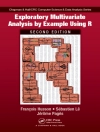With humor, extraordinary clarity, and carefully paced explanations and examples, Bruce Thompson shows readers how to use the latest techniques for interpreting research outcomes as well as how to make statistical decisions that result in better research. Utilizing the general linear model to demonstrate how different statistical methods are related to each other, Thompson integrates a broad array of methods involving only a single dependent variable, ranging from classical and robust location descriptive statistics, through effect sizes, and on through ANOVA, multiple regression, loglinear analysis and logistic regression. Special features include SPSS and Excel demonstrations that offer opportunities, in the book’s datasets and on Thompson’s website, for further exploration of statistical dynamics.
Jadual kandungan
Preface1. Introductory Terms and Concepts Definitions of Some Basic Terms Levels of Scale Some Experimental Design Considerations Some Key Concepts Reflection Problems2. Location Reasonable Expectations for Statistics Location Concepts Three Classical Location Descriptive Statistics Four Criteria for Evaluating Statistics Two Robust Location Statistics Some Key Concepts Reflection Problems3. Dispersion Quality of Location Descriptive Statistics Important in Its Own Right Measures of Score Spread Variance Situation-Specific Maximum Dispersion Robust Dispersion Descriptive Statistics Standardized Score World Some Key Concepts Reflection Problems4. Shape Two Shape Descriptive Statistics Normal Distributions Two Additional Univariate Graphics Some Key Concepts Reflection Problems5. Bivariate Relationships Pearson’s r Three Features of r Three Interpretation Contextual Factors Psychometrics of the Pearson r Spearman’s rho Two Other r -Equivalent Correlation Coefficients Bivariate Normality Some Key Concepts Reflection Problems6. Statistical Significance Sampling Distributions Hypothesis Testing Properties of Sampling Distributions Standard Error/Sampling Error Test Statistics Statistical Precision and Power p CALCULATED Some Key Concepts Reflection Problems7. Practical Significance Effect Sizes Confidence Intervals Confidence Intervals for Effect Sizes Some Key Concepts Reflection Problems8. Multiple Regression Analysis: Basic GLM Concepts Purposes of Regression Simple Linear Prediction Case #1: Perfectly Uncorrelated Predictors Case #2: Correlated Predictors, No Suppressor Effects Case #3: Correlated Predictors, Suppressor Effects Present b Weights versus Structure Coefficients A Final Comment on Collinearity Some Key Concepts Reflection Problems9. A GLM Interpretation Rubric Do I Have Anything? Where Does My Something Originate? Stepwise Methods Invoking Some Alternative Models Some Key Concepts Reflection Problems10. One-way Analysis of Variance (ANOVA) Experimentwise Type I Error ANOVA Terminology The Logic of Analysis of Variance Practical and Statistical Significance The ‘Homogeneity of Variance’ Assumption Post Hoc Tests Some Key Concepts Reflection Problems11. Multiway and Alternative ANOVA Models Multiway Models Factorial versus Nonfactorial Analyses Fixed-, Random-, and Mixed-Effects Models Brief Comment on ANCOVA Some Key Concepts Reflection Problems12. The General Linear Model (GLM): ANOVA via Regression Planned Contrasts Trend/Polynomial Planned Contrasts Repeated Measures ANOVA via Regression GLM Lessons Some Key Concepts Reflection Problems13. Some Logistic Models: Model Fitting in a Logistic Context Logistic Regression Loglinear Analysis Some Key Concepts Reflection Problems Appendix: Scores (n = 100) with Near Normal Distributions
Mengenai Pengarang
Bruce Thompson is Distinguished Professor of Educational Psychology and Distinguished Professor of Library Sciences, Texas A&M University, and Adjunct Professor of Family and Community Medicine, Baylor College of Medicine, Houston. He is the coeditor of the teaching, learning, and human development section of the American Educational Research Journal and past editor of Educational and Psychological Measurement, the series Advances in Social Science Methodology, and two other journals. He is the author or editor of 10 books, has written over 175 research articles, and has made contributions that have been influential in promoting greater emphasis on effect size reporting and interpretation, and improved understanding of score reliability.












